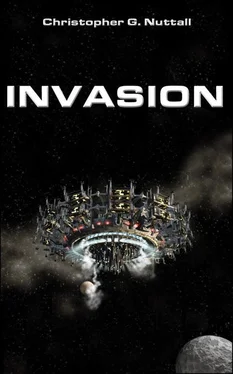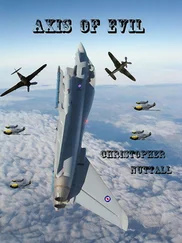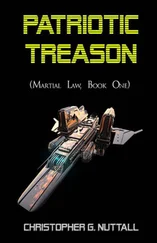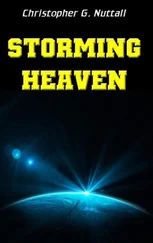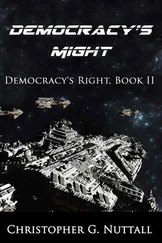A quarter of Rome’s population had fled the city well beforehand, going to live in the country or with friends and family in other parts of Europe. Half of those that remained were killed outright, or died within the first hour of the blast… and they were the lucky ones. For the remaining citizens of Rome, the nightmare had only just begun…
And, of the Vatican and its centuries of history, almost nothing was left.
* * *
The High Priest watched dispassionately as the fireball billowed out over the City of Rome. The shielded satellites that were constantly observing the planet below the Guiding Star had tracked the weapon from the moment it was launched to the moment of detonation, whereupon they’d started to monitor the devastation. The humans below had been slaughtered in the blast — and the High Priest mourned their deaths — but the centre of their religion had been destroyed. Few would go now to the City of Rome, few would even consider rebuilding it, not when it could be knocked down again in a heartbeat. Some of the Inquisitors had even called for a second strike, mounted as soon as the humans started recovery efforts, but the High Priest had rejected that as meaningless barbarism. It wasn’t as if the humans below could hurt them in orbit. If they had had such weapons, they would have deployed them against the bombing ship.
He turned his attention to the near-orbit display. The Inquisitors, as untouched as ever by the magnitude of what they’d done, were coming in to dock with the Guiding Star , probably not even expecting praise for their actions. They’d killed, at the very least, hundreds of thousands of humans… and they didn’t even care. There was a reason why even the High Priest disliked the Inquisitors; if he showed any weakness, or lack of resolve and ability, they would turn on him. They were… not popular.
But they were necessary. The Guiding Star was a closed environment. When the starship had been launched, it had been outfitted with all the supplies it needed… and could carry. It could not afford dissent or even major changes in society, not when they operated with so few supplies, whatever the reason. The population of the ship, all one billion of them, had exactly what they needed, no more, no less. The massive farms on the habitation module produced enough food for the people, but barely… and as for having luxuries, forget it. The High Priest had few perks that came with the robe, and many problems. He had thought, back when he’d been an under-priest, that the High Priest had had everything, but he knew now that that wasn’t true. He might have had extra servings of some foods, and the occasional sip of forbidden water, but that was about it, even for his rank. They couldn’t afford a major social upheaval that would come, inevitably, from so many perks for the high-ranking priests.
And yet… the humans had so much. They had barely developed a space program — and smashing what they’d had in space had been easy, far easier than he’d allowed himself to anticipate — but their civilians had so much. They all seemed to have their own means of transport, their own computers, their own links to the human computer network that was proving so hard to shut down… they had so much, and his people had so little. The Takaina had access to the endless wealth of space; they could have provided their people with such a lifestyle, but that would have meant that they couldn’t launch further colony ships out towards the stars. He knew, even if the Inquisitors didn’t, that there were warriors down on Earth wondering why the humans had so much, and they so little. Looting and pillaging were forbidden, on pain of a sudden and horrible death, but there were dozens of reports of just that. Envy was a powerful motivator… and, now that there was an uneasy peace in Texas, the warriors had time to think.
Human religions, according to the researchers, discouraged thinking. That was alien to the Takaina — literally. They needed their warriors as dangerous as possible and that meant training them to think and react to any situation, without having to wait for orders from higher up the chain. The majority of the population was actually fairly young, due to the magic of cold sleep, and they were thinking… and wondering why they didn’t have so much themselves. The Truth had originated — and the High Priest mentally punished himself for even thinking of it — in a part of their homeworld where resources had been scarce. That had driven them onwards, to conquest and glory… and yet, it seemed so weak when suddenly faced with so much obvious wealth. Young warriors, down on Earth without the strictures of their clans, might make the wrong decisions…
He cast his attention towards the new landing sites. The landings had been on a much larger scale, but this time, they’d known where to bombard. The humans didn’t seem to have any concept of basic security; the researchers had discovered, fairly easily, entire books of tactical and strategic data on the entire world. Instead of telling their people what they needed to know, the humans were allowing them to know everything… or, at least, far more than they really needed to know, or even care about. A chart of bases in the Middle East, useless to the human who’d died defending his home, had been very useful to the planners when the invasion began…
This time, it was going to be a far more powerful offensive. The bombardment had been much more carefully planned, and, now that they had better intelligence, should be almost decisive on its own. The landing forces had landed in three human countries… and then were expanding out as rapidly as possible. The most powerful country in the region might be a problem, which was why it had been left for last — there was also a human religious element involved, although none of the researchers could explain why it was still there — but the remaining militaries would just melt away. They didn’t know it, yet, but they had nowhere to hide. The cities of Jerusalem and Mecca would be taken soon… and they would be used to bring down the human religions and replace them with the Truth. The High Priest was certain of it…
So why did he have those quiet nagging doubts?
He dismissed them and turned to the War Leader. “I want the enemy organised resistance quelled within the next two cycles,” he ordered. The human resistance had been disorganised all over the region; some units had fought well, if utterly outclassed, and some had just scattered and run. They’d had to be rounded up quickly to prevent them from turning into insurgents later. “Keep up the pressure on their governments and don’t let them have a chance to form a new defence line.”
“Of course, Your Holiness,” the War Leader said. “As unprepared as they were, they will fall before us.”
“Good,” the High Priest said. If nothing else, a second round of fighting would keep the warriors from having uncomfortable thoughts. “Keep me updated on the progress of the invasion.”
The War Leader bowed and retreated. The High Priest knew that he should relax. He’d done all he could to ensure victory… but he still had those nagging doubts. Only victory would salve his concerns… and victory was just around the corner. It just felt as if they’d made a terrible mistake.
He was sure of it.
It is an illusion that youth is happy, an illusion of those who have lost it; but the young know they are wretched, for they are full of the truthless ideals which have been instilled into them, and each time they come in contact with the real they are bruised and wounded.
— W. Somerset Maugham
His name was Naseer Ziad and he was nineteen years old.
Читать дальше
